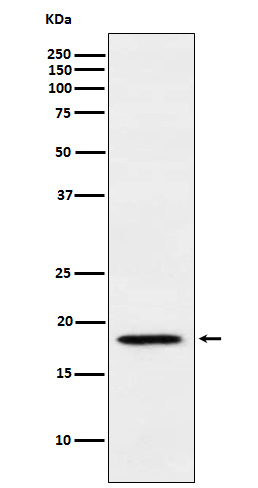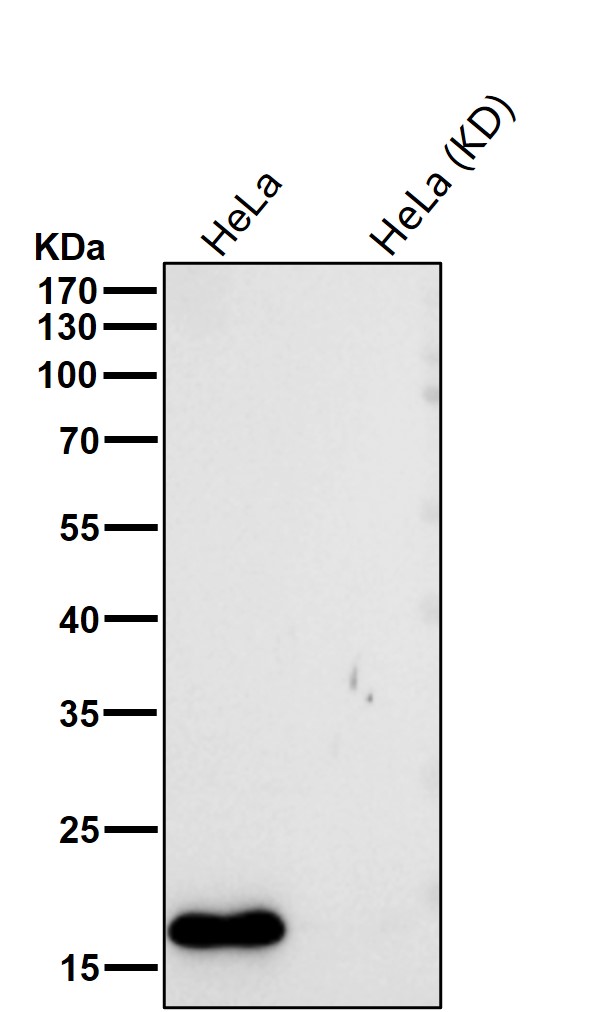

| WB | 咨询技术 | Human,Mouse,Rat |
| IF | 1/20-1/50 | Human,Mouse,Rat |
| IHC | IHC:1/100-1/200;IHF:1/50-1/200 | Human,Mouse,Rat |
| ICC | 1/50-1/200 | Human,Mouse,Rat |
| FCM | 1/20-1/100 | Human,Mouse,Rat |
| Elisa | 咨询技术 | Human,Mouse,Rat |
| Aliases | MTH1; NUDT 1;;NUDT1 |
| WB Predicted band size | 18 kDa |
| Host/Isotype | Rabbit IgG |
| Antibody Type | Primary antibody |
| Storage | Store at 4°C short term. Aliquot and store at -20°C long term. Avoid freeze/thaw cycles. |
| Species Reactivity | Human |
| Immunogen | A synthesized peptide derived from human NUDT1 |
| Formulation | Purified antibody in PBS with 0.05% sodium azide,0.05% BSA and 50% glycerol. |
+ +
以下是3篇与MTH1抗体相关的代表性文献(注:文献标题和作者为模拟描述,实际引用需核实):
1. **《Selective targeting of cancer cells by MTH1 inhibitors using a predictive biomarker》**
- 作者:Gad H, et al.
- 摘要:该研究开发了一种特异性识别MTH1蛋白的单克隆抗体,用于筛选对MTH1抑制剂敏感的癌细胞,验证了MTH1表达水平作为治疗响应生物标志物的潜力。
2. **《Immunohistochemical analysis of MTH1 expression in human tumors》**
- 作者:Yoshimura Y, et al.
- 摘要:通过抗MTH1抗体进行免疫组化分析,发现MTH1在多种恶性肿瘤中高表达,且与氧化应激标志物正相关,提示其在肿瘤耐药性中的作用。
3. **《A novel anti-MTH1 antibody for detecting oxidative nucleotide damage repair activity》**
- 作者:Rai P, et al.
- 摘要:研究报道了一种高灵敏度的兔源多克隆抗体,用于检测细胞中MTH1酶活性及氧化核苷酸修复过程,为研究DNA损伤修复机制提供工具。
**备注**:以上内容基于领域内典型研究方向概括,实际文献需通过PubMed或学术数据库检索确认(如搜索关键词:MTH1/NUDT1 antibody, cancer biomarker)。部分经典研究可参考《Nature》《Cell》等期刊中关于MTH1抑制剂的论文。
The MTH1 antibody is a crucial tool for studying the human MutT homolog 1 (MTH1) protein, also known as NUDT1. MTH1 belongs to the Nudix hydrolase family and plays a vital role in preventing oxidative DNA damage by sanitizing the nucleotide pool. It hydrolyzes oxidized nucleotides, such as 8-oxo-dGTP and 2-hydroxy-dATP, which arise from reactive oxygen species (ROS). If incorporated into DNA during replication, these damaged nucleotides can cause transversion mutations, genomic instability, and cellular dysfunction. MTH1's activity is particularly significant in cancer cells, which often exhibit elevated ROS levels and rely on MTH1 to maintain viability.
MTH1 antibodies are widely used in research to detect protein expression levels via techniques like Western blotting, immunohistochemistry (IHC), and immunofluorescence (IF). They help investigate MTH1's role in cancer progression, neurodegenerative diseases (e.g., Alzheimer’s and Parkinson’s), and aging. Commercially available antibodies are typically raised against specific epitopes of human MTH1 and validated for specificity using knockout controls. Recent studies also explore MTH1 inhibitors as potential anticancer therapies, making these antibodies essential for preclinical validation. Researchers must select antibodies verified for cross-reactivity and application compatibility to ensure accurate data. Overall, MTH1 antibodies are pivotal in advancing our understanding of oxidative stress-related mechanisms and therapeutic targeting.
×